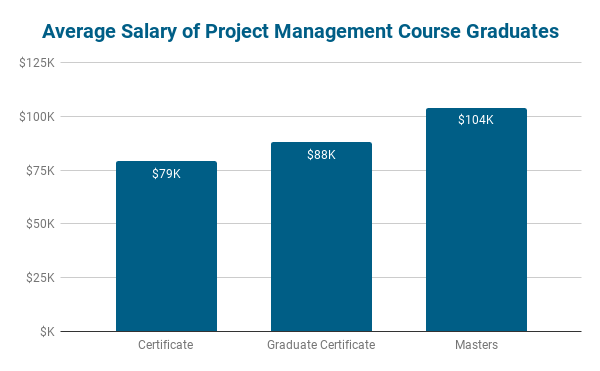Choose one of our Project Management courses
Take the first step towards your future
Unlock a world of opportunities with our comprehensive course brochure. This guide provides all the essential details you need to make an informed decision.
Inside, you’ll find details on:
- Entry requirements
- Course duration and structure
- Fees and financing options
- Subjects and assessments
- Industry connections and opportunities
- Student support services
- Career pathways and outcomes
Why study project management?
Studying a project management course gives you a set of versatile skills, scalable across any industry. A career as a project manager is varied and fast-paced. It’s a great choice if you like challenging work with lots of moving parts. No two days are the same, when you work in project management.
Research shows that on average a person will have 5 different careers in their lifetime. Studying project management is a unique course because it offers scalable skills and knowledge, which means you can take what you learn across different roles over the course of your career.
Popular industries for project managers to work in include: Information Technology, Construction, Engineering and Logistics. Project managers drive projects such as the 5G mobile network technology roll-out, railway upgrades such as Melbourne’s Metro Tunnel and Brisbane’s new runway, the largest aviation construction project in Australia — to name a few.
While the above industries are big advocates of highly skilled project managers, there’s plenty of other industries and organisations in private and public industries that hire (and value) them too, such as local councils and healthcare industries.
Project managers have the technical skills to execute successful projects on-time and to budget as well as a range of soft skills such as the ability to negotiate, lead and delegate. Studying project management sets you apart, and shows your commitment to being a highly-skilled competent project manager in a fast-changing business landscape.
What do you learn in a project management course?
You can study Project Management at a certificate, graduate diploma and masters level. Here are some of the unit offerings in the Project Management courses at Southern Cross University:
Project management units offered online at Southern Cross University:
What are the salary expectations of a graduate from a project management course?
According to Pay Scale, entry level project management salaries average at $80,000 a year, while a project manager (with an unspecified industry) with 5 - 10 years experience can earn up to $100,000.
Source: PayScale - 21st November 2018
How long does it take to study a project management course?
There are a few modes of study options available for those looking to study project management, including online options. Online students interact with their peers and unit course assessors in discussion groups each week, and online study is often accelerated, allowing you to graduate faster.
You can study a project management at a certificate, diploma and masters level. Southern Cross University offer a Graduate Certificate in Project Management (8 months part-time), a Graduate Diploma in Project Management and a Master of Project Management (2 years part-time). Many organisations favour qualifications with endorsement from the Australian Institute of Project Management.
Study project management courses online
If you’re working full-time, the thought of making time to go to a university campus to study could seem almost impossible. Thankfully many universities are offering a range of online undergraduate and postgraduate courses.
For some universities, this means 100% online, where you complete a series of readings, activities and assessments through an online learning portal and engage with academics and fellow students in online chat groups.
For others, it means having resources posted to you in the mail and completing readings and tasks through a series of prompted lessons.
See what it’s like to study online at Southern Cross University
Career Pathways for Project Management Graduate
We’ve profiled some of the career options for those who graduate from a project management course.
You will lead customer engagement to ensure a project meets all scope, time, budget and quality expectations. Responsibilities include all planning, controlling and managing of corporate, customer and third party vendor efforts to plan, sell and implement infrastructure projects.
Your skills in project management help achieve business objectives.
You look after contract administration, organisational programs, special projects and support services. You are a key liaison for business stakeholders and the unique ability to anticipate business needs will be highly advantageous in this role.
You may work as part of the Project Management Office (PMO) on projects within a program, or may be a lead project manager on a given project. You develop, plan and deliver projects systematically – using tools and change management frameworks. As a senior project manager, it is your job to have the in-depth skills to be able to successfully lead a project to success, which includes technical know-how and also the people skills such as internal stakeholder management that helps you drive project success.
As the manager of the Project Management Office you’ll ensure the successful delivery of project services. This includes scope and variation control, timelines and schedules, costs, estimates, quality assurance, risk and issue management, communications, procurement and contracts, document control, steering committee reporting and more.
You will design intelligent business solutions for your workplace and your clients, using your knowledge of tools and technologies to implement business solutions and manage projects. This is a role that needs attention to detail and extraordinary data analysis skills.
You are a key support to the project team. Your work includes supporting the implementation and delivery of strategic and resourcing initiatives across the business. Analysis and management of data collected are a big part of your role, and often includes the tracking of budgets and forecasting of finances.
A contract administrator in project management oversees contract creation, ensures compliance, and manages changes throughout a project. They work closely with project managers and stakeholders, ensuring all parties meet their contractual obligations. Strong attention to detail, negotiation skills, and legal knowledge are key to keeping projects on track and within budget.
What are the skills you’ll learn?
You’ll learn project management methodologies and what’s required to meet project goals. You will learn the skills to make complex, strategic decision quickly and have the ability to know (with confidence) whether a project is likely to succeed or fail. Core units include project management initiation and planning, quality control and risk, leading and managing projects, procurement and project management, and portfolio and program management. Below are some other skills you will learn:
You will learn how to stay versatile in today’s fast-paced business environment. The skills you learn are versatile, being able to be applied across any industry, while also equipping you with the skills to adapt within a project as you gain new information and move along in a project’s timeline.
You will learn the skills that help you be the ultimate problem-solver, to evaluate all of the information you have to make an informed decision about what your next step is.
You will learn how to successfully interact with clients face to face, and get the best out of people (and processes) to help deliver successful projects on-time. There’s often internal and external stakeholder management skills required, and having the skills to independently manage these is key to success.
A good project manager has strategic thinking skills (and good organisations recognise these skills and their advantages), and uses them to effectively promote change, drive innovation and ultimately promote project success.
Studying an accredited project management course builds your technical skills. You’ll learn to ask questions such as: what is the scope? How are we measuring quality? What can’t we control but is paramount to our success?
About postgraduate study
A Master of Project Management offers the opportunity for deep learning and the acquisition of skills and knowledge to be a highly-skilled, technical project manager.
Studying an endorsed course in Project Management sets you apart from your peers. A recent survey revealed 45 per cent of projects are met with stakeholder satisfaction and only 47 per cent meet the project’s original goal and business intent, while a mere 23 per cent of organisations say successful projects are delivered most of the time. This survey reveals massive opportunities for those willing to invest in advanced education to become brilliant project managers.
Learn about Southern Cross University’s online Master of Project Management







